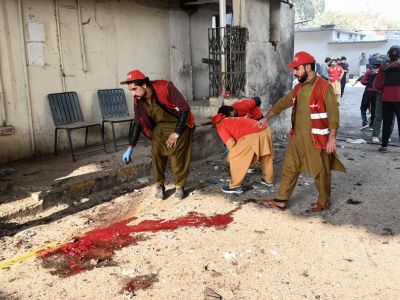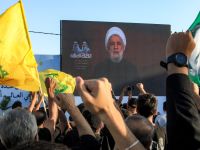An Iranian MP on Tuesday slammed a court decision imposing a 22-month jail term on a female colleague after she was convicted of various charges including "endangering the Islamic establishment," reported the official Iranian news agency, IRNA.
"I attended the trial of (Fatemeh) Haqiqatjou. To me, Mr. (Judge) Saeed Mortazavi is not competent to hear the case," Fatemeh Rake'ie, the head of the women’s grouping in Parliament, told chamber deputies, adding, "I am proud of Haqiqatjou for the courage that she has displayed."
Haqiqatjou on Monday was sentenced by the court to serve 22 months in prison after being convicted.
She was convicted by Tehran's press court of "misinterpreting the late Imam Khomeini's words, propagandizing against the Islamic system and its foundations, insulting the members of the constitutional watchdog Guardian Council, and insulting the head of Tehran's revolutionary court."
Haqiqatjou was arrested in March and later released after Parliament's supervisory board intervened.
According to AFP, the charges refer to statements she made before Parliament in early March, when she objected to what she called violence by security forces in arresting a pro-reform female journalist.
At the time of her arrest, MPs had been insisting on their right to immunity from prosecution after reports emerged that the conservative-led courts were preparing legal cases against a number of leading deputies.
The announcement of the verdict came as the reform-dominated Parliament on Tuesday continued a drawn-out debate on cabinet nominees proposed by President Mohammad Khatami, who was re-elected to a second four-year term in June.
Reformist MP Rajab-Ali Mazroui criticized the judiciary as well as parliamentary speaker Mehdi Karubi, calling on them to defend deputies against what he called systematic attacks by judicial bodies.
"What are we doing here if we cannot speak before Parliament?" he was quoted by AFP as saying, insisting that MPs were ready to go to prison if they could not defend the people and their interests.
Female MPs had threatened to leave the chamber but were persuaded to stay by Karubi and Haqiqatjoo, who was present for the debate.
During the past 12 months, at least 30 MPs have been summoned by the judiciary while others have been condemned for declarations made before the chamber.
The debate over Khatami's new cabinet nominees had been expected to end late Sunday or Monday, but has carried on, said AFP.
Khatami named new ministers of finance, labor, health, cooperatives and transport, while the former cooperatives minister was moved to the ministry of education. All other ministers were re-named.
The president is facing pressure from both sides. Radical reformists charge that his line-up is not a true reform cabinet, while he remains under pressure from powerful conservatives who stymied much of his first-term agenda.
President Khatami crushed his opponents in Iran's June 8 presidential elections, winning an unexpectedly decisive mandate to forge ahead with his controversial democratic reforms.
The president, who also won by a landslide in 1997 when he was first elected to office, will face several obstacles during his second term, including an economically devastating drought, and rampant attempts to smuggle drugs from Afghanistan to Europe via Iran.
But a key challenge comes from the ultraconservative judiciary branch and a range of other entrenched forces.
The 57-year-old president is accused by conservatives of undermining the Islamic regime by allowing unprecedented freedoms.
Throughout his re-election campaign, the mid-ranking cleric vowed that greater freedom was compatible with an Islamic regime, and the only way forward in a nation where two-thirds of the population is under 35.
In fact, ever since his election in 1997 Khatami has been struggling to alter the politics of Iran.
Iran's governmental structure has a division of power between three institutions; the president, Parliament and the supreme leader. The president and the members of the Parliament are elected and act essentially as the legislature and executive. The religious chief is the head of judiciary and the guardian of the Islamic Constitution of the country. While all three institutions are important, the religious head has the power to override the parliament as well as the President. In this peculiar arrangement the un-elected office of the religious head has more power than the elected offices.
According to the New York Times, since the June 8 presidential vote, the conservatives have used institutions like the judiciary, the police and unelected religious organizations they control to place added pressure on the reformers.
The Times report cites examples of arrests and convictions of reformists, including MPs, the cancellation of a parliamentary act, and “scandals” unveiled to the detriment of pro-reform figures.
The conservatives are also able to enlist the support of paramilitary thugs in organizations such as Ansare Hizbollah to strong-arm and intimidate democracy activists and supporters of Khatami. Although their members have carried out a number of assassinations and beatings of prominent moderates, those responsible have never been apprehended. The pro-democracy students are demanding that these groups be brought under control and that those responsible for acts of violence be arrested.
A pivotal moment in the conservative-reformist conflict came in early August, when Khatami’s inauguration was postponed on supreme leader Ayatollah Ali Khamenei's orders.
Khamenei said in a statement read out on television that the ceremony should not take place before a power struggle between reformists and conservatives, which has plunged the Islamic republic into a constitutional crisis, was settled.
Reformist lawmakers and the conservative judiciary clashed over representation on Iran's powerful, conservative-controlled Guardians Council, with Parliament rejecting candidates nominated by the judiciary to take seats on the council, which rules on constitutional matters.
The matter, though eventually resolved, could bode ill for future relations between reformists and conservatives.
"Rigid-mindedness is a main threat to the revolution and the Islamic republic," Khatami told a crowd of tens of thousands gathered this spring to mark the 1979 Islamic revolution that toppled the US-backed dictator, the Shah – Albawaba.com
© 2001 Al Bawaba (www.albawaba.com)









